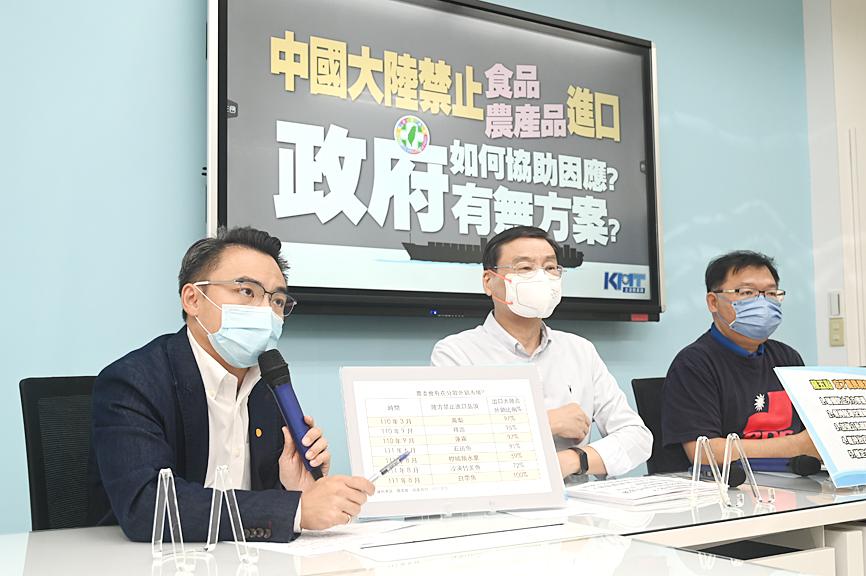Opposition lawmakers yesterday called on the government to implement more robust policies to better protect Taiwan from Chinese economic and military aggression.
Citing China’s ban on products from 100 Taiwanese companies announced on Monday, Taiwan People’s Party (TPP) Legislator Chiu Chen-yuan (邱臣遠) said the government should implement four measures to better protect agricultural producers.
It should establish a dedicated consulting and counseling unit, and a dedicated hotline to provide assistance to affected businesses, he said.

Photo: Tien Yu-hua, Taipei Times
It should also expand overseas markets for Taiwanese products, improve inspection of agricultural products before export and negotiate agricultural trade agreements with several nations, he said.
The largest market for many of Taiwan’s agricultural and fisheries products is China, TPP Legislator Jang Chyi-lu (張其祿) said, citing groupers and beltfish, 90 percent of which are sold to China.
The proportion of mackerel sold to China has also increased from 49 percent last year to 72 percent this year, he said.
In response, Bureau of Foreign Trade Deputy Director-General Lee Guann-jyh (李冠志) said the government is diversifying export markets of products such as processed foods, of which the US buys 30 percent, while China buys only 12 percent.
Council of Agriculture Department of International Affairs Deputy Director Lin Chih-hung (林志鴻) said his office is also busy working on expanding overseas markets.
It is providing incentives and subsidies for grouper sales to overseas markets and had already exported 151 tonnes of the fish as of Sunday, he said, adding that it is aiming for 300 tonnes by the end of the year.
The proportion of fresh fruit sold to China was also reduced to 41 percent last year from 84 percent the year before, he said.
Separately, Chinese Nationalist Party (KMT) legislators urged the government not to employ an “anti-China protectionist” economic policy as a tactic to perform well in the local elections in November.
The government should provide necessary assistance and subsidies to companies, farmers and fishers affected by China’s import bans, KMT caucus whip William Tseng (曾銘宗) said.
“The government should assume that China would take retaliatory economic measures one after another, and should put forward a specific plan and to assist affected industries,” he said.
The government should restore the 2008 Cross-Strait Food Safety Agreement (海峽兩岸食品安全協議) and reopen cross-strait channels of communication as soon as possible, KMT caucus deputy secretary-general Lee De-wei (李德維) said.
KMT Legislator Hung Meng-kai (洪孟楷) criticized a rural tourism lottery implemented by the Council of Agriculture as a means of boosting revenue for farmers, saying the measure was far from adequate.
“The council should appeal to the WTO and fight for Taiwanese farmers’ and fishers’ rights,” he said.

Three Taiwanese airlines have prohibited passengers from packing Bluetooth earbuds and their charger cases in checked luggage. EVA Air and Uni Air said that Bluetooth earbuds and charger cases are categorized as portable electronic devices, which should be switched off if they are placed in checked luggage based on international aviation safety regulations. They must not be in standby or sleep mode. However, as charging would continue when earbuds are placed in the charger cases, which would contravene international aviation regulations, their cases must be carried as hand luggage, they said. Tigerair Taiwan said that earbud charger cases are equipped

Foreign travelers entering Taiwan on a short layover via Taiwan Taoyuan International Airport are receiving NT$600 gift vouchers from yesterday, the Tourism Administration said, adding that it hopes the incentive would boost tourism consumption at the airport. The program, which allows travelers holding non-Taiwan passports who enter the country during a layover of up to 24 hours to claim a voucher, aims to promote attractions at the airport, the agency said in a statement on Friday. To participate, travelers must sign up on the campaign Web site, the agency said. They can then present their passport and boarding pass for their connecting international

WEATHER Typhoon forming: CWA A tropical depression is expected to form into a typhoon as early as today, the Central Weather Administration (CWA) said yesterday, adding that the storm’s path remains uncertain. Before the weekend, it would move toward the Philippines, the agency said. Some time around Monday next week, it might reach a turning point, either veering north toward waters east of Taiwan or continuing westward across the Philippines, the CWA said. Meanwhile, the eye of Typhoon Kalmaegi was 1,310km south-southeast of Oluanpi (鵝鑾鼻), Taiwan’s southernmost point, as of 2am yesterday, it said. The storm is forecast to move through central

Taiwan sweltered through its hottest October on record, the Central Weather Administration (CWA) said yesterday, the latest in a string of global temperature records. The main island endured its highest average temperature since 1950, CWA forecaster Liu Pei-teng said. Temperatures the world over have soared in recent years as human-induced climate change contributes to ever more erratic weather patterns. Taiwan’s average temperature was 27.381°C as of Thursday, Liu said. Liu said the average could slip 0.1°C by the end of yesterday, but it would still be higher than the previous record of 27.009°C in 2016. "The temperature only started lowering around Oct. 18 or 19